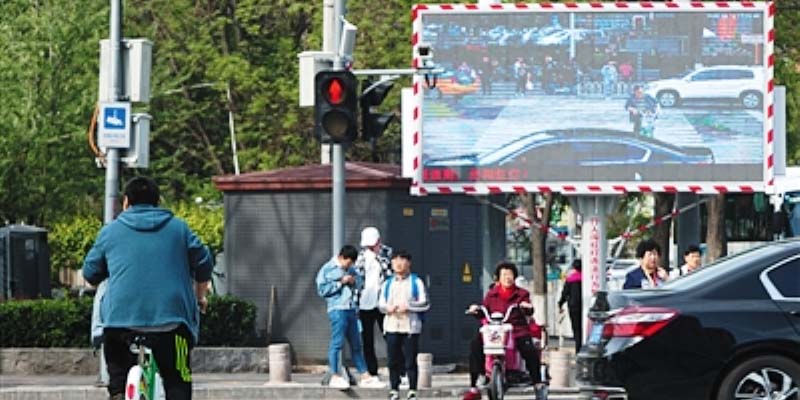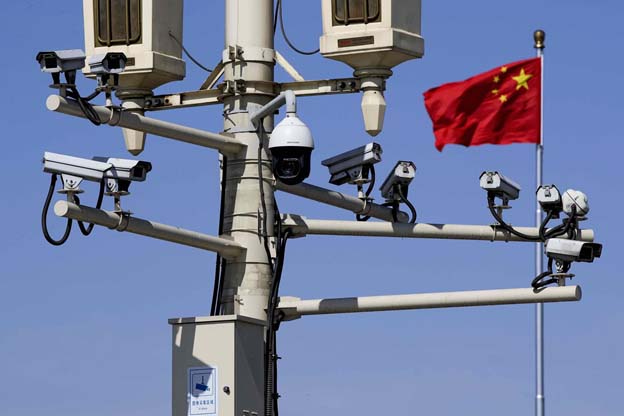Disclaimer: The Eqbal Ahmad Centre for Public Education (EACPE) encourages critical and independent thinking and believes in a free expression of one’s opinion. However, the views expressed in contributed articles are solely those of their respective authors and do not necessarily reflect the position or policy of the EACPE.
You can contribute your writings at newsletter@eacpe.org
The Chinese Communist Party is creating a digital mass surveillance system – one that has its resonances in George Orwell’s 1984
Imagine living in a society where you are rated by the government on your trustworthiness. Your “citizen score” follows you wherever you go. A high social credit score has its perquisites: you are allowed access to high-speed internet service and a fast-tracked visa to Europe. If you make provocative political posts online, fail to pay your bills or delay on your debt, question the government’s narrative of events or if you are caught simply jaywalking, your score decreases. A low score means you lose some of your rights – you can’t buy a train ticket, you can’t eat at a restaurant, you can’t get a loan or insurance or leave the country. To calculate your citizen score, private companies aligned with the government constantly peruse through your online activity, extracting vital pieces of information and using it to plan your future in the country.
When you leave the online world and step outside of the house, your physical activity is also monitored and your actions swept into the dragnet: the government collects humongous amounts of information from the millions of surveillance cameras scattered across the alleys, streets, subways, restaurants, intersections and government facilities across the city. If you commit a crime, or if you are caught jaywalking, facial recognition algorithms will match your footage to the national criminal database. It won’t be long until the police show up at your doorstep and drag you across the porch handcuffed.
This society may seem dystopian, but it isn’t a far-fetched fantasy: It may be China in a few years. The country is on its way to become the first to implement a pervasive system of algorithmic surveillance, and it has so far succeeded quite nicely. China now has eight of the ten most surveilled cities in the world. By harnessing advances in artificial intelligence and data-mining and storage to construct detailed profiles of all citizens, China’s Communist party-state is developing a “citizen score” to “incentivize” good behaviour. A sophisticated network of surveillance cameras now monitor millions of Chinese citizens’ movements, purportedly to reduce crime and terrorism. While the expanding Orwellian eye (there, I said it!) may, in theory, improve public safety, it is increasingly becoming a chilling new threat to civil liberties in a country already with one of the most repressive governments in the world.
George Orwell’s 1984 opens in Oceania, a dystopian world governed by an all-controlling totalitarian regime which runs a massive propaganda campaign to brainwash the population into thinking obedience to its leader – the Big Brother. Ingsoc – the ruling party – surveils and controls every aspect of the people’s lives; it monitors the thoughts and actions of the citizens meticulously and decides their fate accordingly. Under this repressive regime, just the thought of dissent – thoughtcrime – can lead to incarceration and possibly execution. Every word uttered and every step taken is closely watched. You cannot conceal yourself. The Big Brother is always watching you.
Perhaps no novel of the past century has had more influence on modern thought than Orwell’s 1984. It is an ineffable work of imagination shaped by the author’s experience fighting Spain’s Fascist government and his subsequent disillusionment with the resistance – of which he was a part – that intended to establish authoritarianism in its place. Many of the words coined by the author reverberate in the vocabulary of the 21st century as signs of a nightmarish future. With the mass-surveillance systems being tested in many countries around the globe, and our electronic devices eavesdropping on our conversations and monitoring our actions, Orwell’s nightmare seems all too familiar. It is almost impossible to talk about surveillance, totalitarianism, authoritarian politics and state-sponsored propaganda without dropping a reference to 1984.
1984 is not a long book – my copy is just 254 pages. One can finish it off in just a few sittings. Reading the book was in many ways a disabusing experience. There were times when I stopped and questioned: “Will this dystopia ever become a reality?” I kept wondering if the world will ever witness such a system of digital totalitarianism and mass surveillance, and my answer was always no. This is the 21st century we are living in, I thought. True, the requisite technology is at our disposal, but there are checks and balances to everything, including surveillance. Individual privacy is a great deal these days. The more I thought about it, the more far-fetched it seemed. But then I read about China, and things changed. The Oceania that I feared so much was thriving next door.

With millions of cameras and billions of lines of codes, China is building a high-tech authoritarian future. It is embracing and encouraging emerging technologies like artificial intelligence and data mining to track and monitor its 1.4 billion citizens. With crucial help from the thriving technology industry, China is implementing a ginormous system of algorithmic surveillance. By the end of 2021, a billion cameras around the country will monitor the Chinese citizens. China is justifying mass surveillance as a security measure – the sophisticated system can identify criminals, dissidents and activists and sound a virtual alarm to the local police. The police then arrive at the scene and the suspect is apprehended. The intended crime never occurs and everybody is safe.
China is reversing the commonly held vision of technology as a democratizer, bringing people more freedom and connecting them to the world. China is using technology as a means of control. The high-tech surveillance system identifies not only criminals, but also activists, journalists, dissidents and lawyers – basically anyone that stands up to the Chinese Communist Party or opposes the government’s account of events. In other parts of the country, the technology is being used to single-out and subdue minorities. In some cities, billboard-sized screens show the photos of jaywalkers and those failing to pay their debts. The idea here is to publicly shame the offenders into doing what they are supposed to do. Security cameras equipped with artificial intelligence software line up the entrances to many government and non-government complexes.

China’s massive algorithmic surveillance system is rapidly expanding, and it is no longer limited to just monitoring the Chinese citizens. The Communist Party is now implementing the pervasive social credit system that calls for the unified record system of the Chinese citizens to be tracked and evaluated for trustworthiness. This new system will consolidate reams of records from private companies and government bureaucracies into a single citizen score for each individual. What you buy at the shops and online, where are you at any given time and how long you stay there, what bills and taxes you pay (or not), and how many hours you spent watching movies and video games adds to your credit score. Data-collecting behemoths similar to Google, Facebook, Twitter and WhatsApp constantly monitor your activity and feed all that data to the national surveillance database. From there, your behavior is rated either positive or negative and distilled into a single number: your citizen score. That citizen score then tells the government – and everybody else – how trustworthy, or otherwise, you are. And that’s not it. Your credit score is then publicly ranked to the rest of the population and this ranking then determines whether you are eligible for a job or a mortgage, where your children will go to school and if you will find a date.
The planned data-focused social credit system is only one facet of China’s ambitious algorithmic surveillance system. Another is the fledgling network of technologies, like CCTV cameras manned with advanced AI, to monitor citizens’ physical activity. The Ministry of Public Safety – China’s national police force – states that the law enforcement should use facial recognition technology combined with security cameras to catch lawbreakers on the loose. Even though the goal of this system is to capture criminals and deter crime, it poses serious threats to individual privacy. The modicum of freedom that the Chinese citizens have acquired since the Maoist era is now being jeopardized. There are unreasonable punishments for minor crimes: authorities in certain cities are publicly shaming jaywalkers by showing their faces on public displays or sending them to their employers. More ominous are the punishments likely to be inflicted upon people for their association with dissidents and critics. Thus the installation of an all-seeing-eye alarms the civil liberties and privacy advocates worldwide. The government is already watching the online activity of human rights activists on the pretext of “stability maintenance”, and the surveillance is only growing worse.







